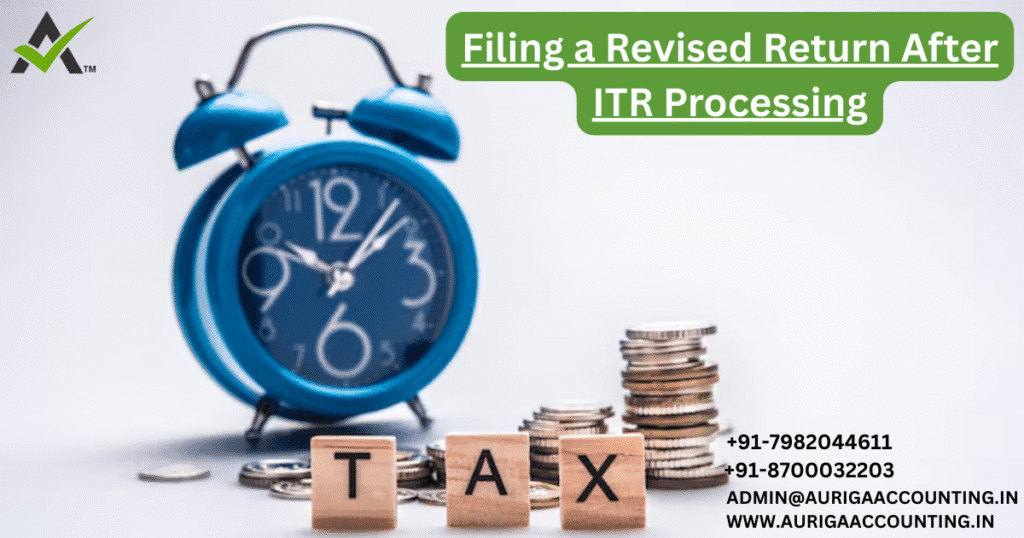
Filing a Revised Return After ITR Processing
Introduction
ToggleRevised Returns
A Revised Return, as per Section 139(5) of the Income Tax Act, 1961, allows taxpayers to correct any errors or omissions in their originally filed or belated return. If you identify mistakes after submitting your ITR, you can file a revised return to make the necessary corrections. This must be done by 31st December of the relevant assessment year or before the assessment is completed—whichever comes first.
Would you like to include examples or a step-by-step guide on how to file a revised return?
When Can You File a Revised Return?
You can file a revised return in the following situations:
Incorrect Income Reporting – If income was omitted or misreported in your original ITR.
Wrong Deduction/Exemption Claims – Mistakes in claiming deductions (e.g., under Sections 80C, 80D) or exemptions.
Incorrect Bank Details – Errors in bank account details that may affect refund processing.
Tax Calculation Errors – Miscalculations in your original tax computation.
TDS Mismatches – Discrepancies between your ITR and Form 26AS.
Wrong Filing Status – Filing under an incorrect ITR form or taxpayer category.
Can You File a Revised Return After ITR Is Processed?
Yes, a revised return can be filed even after your original return has been processed by the Centralized Processing Centre (CPC). However, keep these points in mind:
Time Limit – File it by 31st December of the relevant assessment year or before the assessment is completed, whichever is earlier.
Scope of Correction – You can revise errors, omissions, or incorrect details in your original return.
Impact on Refunds/Taxes – Changes may alter your refund amount or tax payable.
Accuracy Is Key – Ensure all corrections are accurate to avoid future notices or delays.
Time Limit for Filing a Revised Return
According to the latest provisions under Section 139(5) of the Income Tax Act, a revised return must be filed either before the end of the relevant assessment year or before the completion of the assessment, whichever is earlier.
For example, if you filed your original return for the financial year 2023–24 (assessment year 2024–25), the last date to file a revised return is December 31, 2025, unless your assessment is completed earlier.
How to File a Revised Return After ITR Is Processed
Even if your original ITR has been processed by the CPC, you can still revise it to correct any errors or omissions. While the procedure is similar to filing a regular return, extra care is needed after processing. Before revising:
Review your Form 26AS, AIS (Annual Information Statement), and CPC intimation.
Make sure all changes are accurate to avoid filing multiple revisions, which may lead to scrutiny.
Steps to File a Revised Return
Step 1: Log in to the Income Tax e-Filing Portal
Go to the Income Tax Department’s e-Filing portal. Log in using your PAN, password, and complete the CAPTCHA verification.
Step 2: Select the “File Revised Return” Option
Navigate to ‘e-File’ → ‘Income Tax Return’ → ‘File Income Tax Return’. Choose the assessment year for which you want to revise the return.
Step 3: Select the Appropriate ITR Form
Choose the same ITR form that was used for filing the original return (e.g., ITR-1, ITR-2, etc.).
Step 4: Enter the Original Acknowledgement Number
You must enter the acknowledgement number and date of filing of your original return, as required under Section 139(5).
Step 5: Make the Necessary Corrections
Carefully review and update the relevant sections in the return—correct income figures, deductions, exemptions, or any other details as needed.
Step 6: Verify and Submit the Revised Return
After reviewing the updated return, submit it and complete the verification process using one of the following methods:
Aadhaar OTP
Electronic Verification Code (EVC)
Sending a signed ITR-V to CPC, Bengaluru
Rectification vs. Revised Return
Many taxpayers often confuse the process of filing a Revised Return with that of filing a Rectification Request. Here’s a quick breakdown of the differences:
| Feature | Revised Return | Rectification Request |
|---|---|---|
| Purpose | To correct errors made by the taxpayer in the original ITR. | To correct processing errors made by the Centralized Processing Centre (CPC). |
| Filed Under | Section 139(5) | Section 154 |
| Allowed If ITR Processed? | Yes, a revised return can be filed even after the original return is processed. | Yes, but only for correcting apparent errors made in processing, not for errors made by the taxpayer. |
| Example | Missed reporting income, incorrect bank details, incorrect deduction claims. | Incorrect tax credit due to system error by CPC. |
Key Point:
If the error was made during the processing of the return by the CPC (e.g., incorrect tax credit), you should file a rectification request under Section 154, not a revised return. A revised return is meant for mistakes made by the taxpayer in the original filing.
Key Considerations Before Filing a Revised Return
Filing a revised return is allowed, but there are several important factors to keep in mind before proceeding:
No Limit on Revisions:
You can file multiple revised returns, as long as it is within the prescribed due date for filing.Risk of Scrutiny:
Frequent revisions may raise a red flag with the Income Tax Department, potentially leading to increased scrutiny of your returns.Updated Return (ITR-U):
If the deadline for filing a revised return has passed, you can still submit an updated return under Section 139(8A). However, this can only be done if additional tax is payable.Impact on Refund Processing:
If you’re expecting a refund, filing a revised return could delay its processing, as the department needs to review the changes.
Can I File a Revised Return After ITR Processed and Refund Issued?
Yes, you can file a revised return even after the refund has been issued. However, if the revised return shows a lower refund than previously issued, you may be required to return the excess amount.
What If I Miss the Deadline to File a Revised Return?
If you miss the deadline (December 31 of the assessment year), you can still make corrections by filing an Updated Return (ITR-U) under Section 139(8A). But keep in mind:
ITR-U is only allowed for additional income disclosure and cannot be used to claim missed deductions.
An additional penalty (25%–50% of the additional tax payable) applies.
ITR-U cannot be filed if the tax department has already started an assessment.
Common Mistakes to Avoid While Filing a Revised Return
To avoid further complications, ensure you avoid these common mistakes:
Not Verifying the Revised Return:
If the revised return is not verified, it will be considered invalid, and your submission will not be accepted.Filing a Revised Return Without Checking Form 26AS:
Always ensure your TDS and other tax details are accurate by cross-checking them against your Form 26AS before filing.Entering Incorrect Details Again:
Double-check your income, deductions, exemptions, and other details to ensure no new mistakes are made in the revised return.Filing a Revised Return Unnecessarily:
If the original return was accurate, filing a revised return may not be necessary and could lead to unnecessary scrutiny.
Need to File a Revised Return After ITR Processing?
Yes, you can — but getting it right matters. Let the experts at IndiaFilings handle your revised return with precision, helping you avoid errors, delays, and compliance issues.
Ensure accurate corrections and stress-free filing with professional support. Reach out to us today!
About the Author
Manisha
Manisha is a skilled content writer known for simplifying complex legal topics into practical, easy-to-understand insights. Her work equips entrepreneurs with the clarity and confidence needed to navigate business laws and manage their ventures efficiently.












